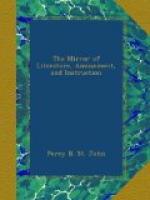At length, escaping from the dust and din of the French Elysium, I halted to enjoy the distant view of the city of Paris, from the gate of the barrier. It was indeed an interesting scene. Through the avenue, whose area presented a living stream of traffic, might be seen the terraces and groves of the Tuilleries, and the spacious and irregular palace, with its cupola tops; the tarnished dome of the Invalides; the cupola of St. Genevieve; the gray towers of Notre Dame; then the winding Seine, with its bridges, quays, and terraces, flanked with the long line of the Tuilleries, and the Luxembourg, and Louvre galleries, on the one side; and on the other by the noble facade of the Chamber of Deputies; the courtly mansions of St. Germain, and the blackened front and dome of the Institute. What a multitude of associations flitted across the memory, by a single glance at PARIS—the capital of that gay, light-hearted, and mercurial people—the French nation—the focus of European luxury, and the grand political arena of modern history, the very calendar of whose events, within the last half century, will form one of the most interesting episodes that ever glowed among the records of human character. In the chain might be traced the vain-glory of conquest linked with defeated ambition, and the sullied splendour of royalty just breaking through the clouds of discontent, and slowly dispelling the mists of disaffection and political prejudice. What an unenviable contrast to the man who has “no enemy but wind and rough weather.” The same objects that prompted these discordant reflections gave rise to others of the most opposite character; and within the walls, where treaties, abdications, and warrants, by turns, settled and resettled, exiled and condemned—were the store-houses of art, with all her proud and peaceful labours of sculpture, painting, and architecture, through galleries and saloons, on whose contents the chisel and the pencil had lingered many a life, and reduced the compass of its fond designs to the cubits of a statue, the fame of a picture, or the glory of a pillar or ceiling—such are the frail elements of human art.
The road now began to exhibit the usual appearance of an approach to a country fete or fair. Scores of pedestrians, overcome with the heat and dust of the day, might be seen at the little boxes or shops of the traiteurs, or cooks, and at the houses of the marchands de vin et de la biacre; these by their anticipated anxiety caused the line from Paris to St. Cloud to resemble a road-side fair. Cheerfulness and vivacity were upper-most in the passengers; and the elastic pace of dozens of gaily-dressed soubrettes not a little enhanced the interest of the scene. Neither were these charms impaired by that species of vulgarity which not unfrequently characterizes the road to our suburban fairs; and, what is still more creditable to humanity, there was no brutality towards jaded horses or hacks sinking beneath their loads.




